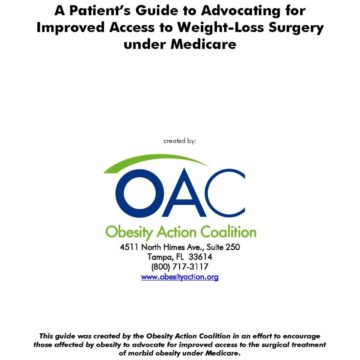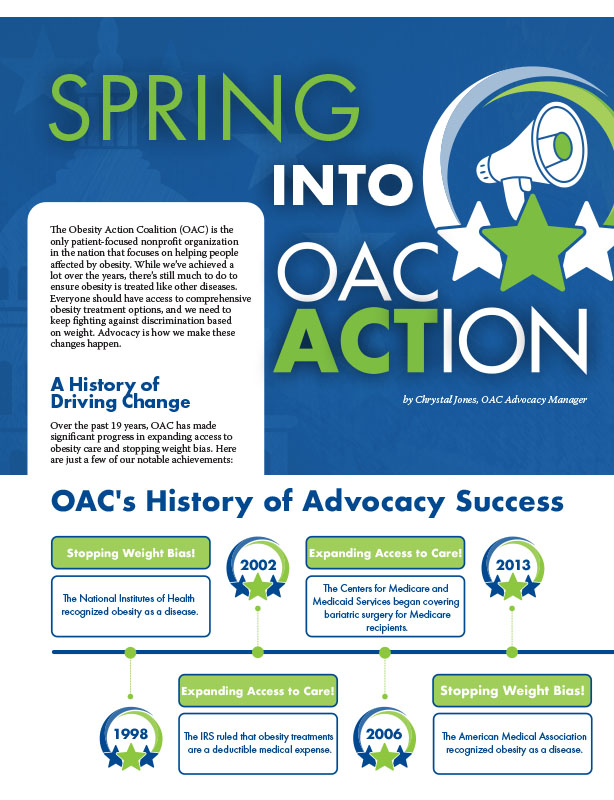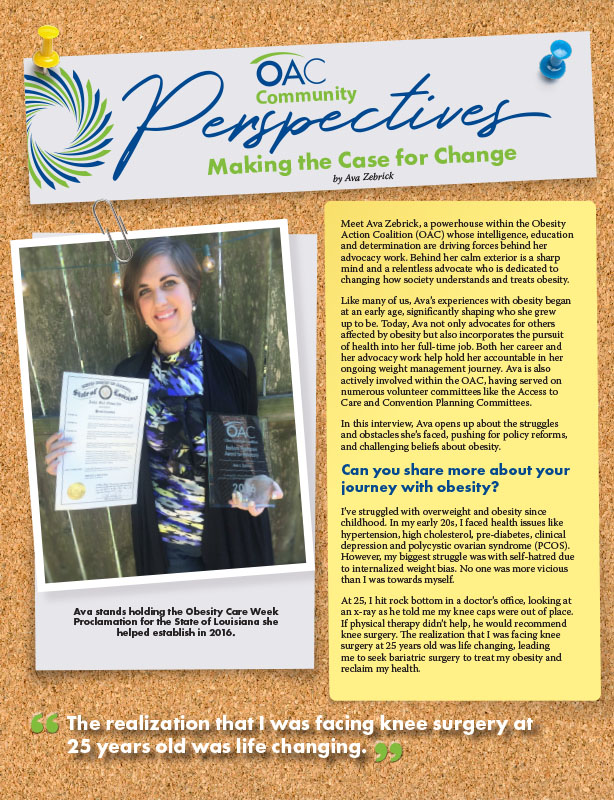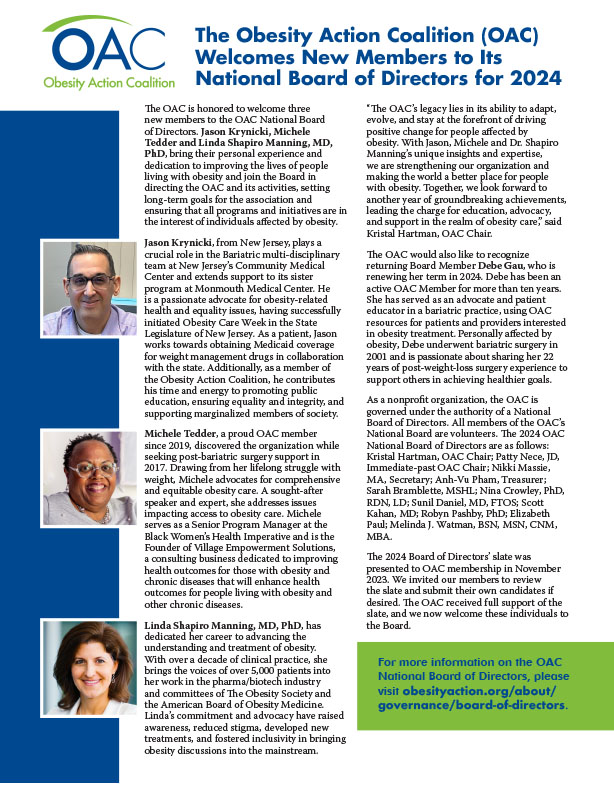The Importance of Advocacy

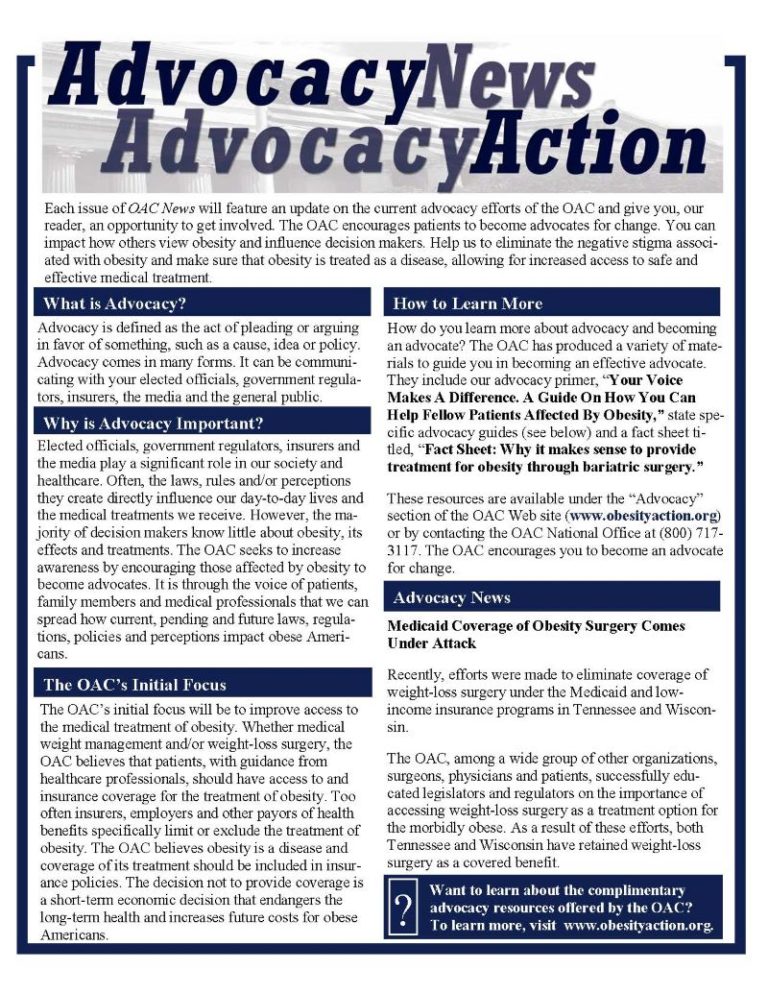
Fall 2005
Each issue of OAC News will feature an update on the current advocacy efforts of the OAC and give you, our reader, an opportunity to get involved. The OAC encourages patients to become advocates for change. You can impact how others view obesity and influence decision makers. Help us to eliminate the negative stigma associated with obesity and make sure that obesity is treated as a disease, allowing for increased access to safe and effective medical treatment.
What is Advocacy?
Advocacy is defined as the act of pleading or arguing in favor of something, such as a cause, idea or policy. Advocacy comes in many forms. It can be communicating with your elected officials, government regulators, insurers, the media and the general public.
Why is Advocacy Important?
Elected officials, government regulators, insurers and the media play a significant role in our society and healthcare. Often, the laws, rules and/or perceptions they create directly influence our day-to-day lives and the medical treatments we receive. However, the majority of decision makers know little about obesity, its effects and treatments. The OAC seeks to increase awareness by encouraging those affected by obesity to become advocates. It is through the voice of patients, family members and medical professionals that we can spread how current, pending and future laws, regulations, policies and perceptions impact Americans with obesity.
The OAC’s Initial Focus
The OAC’s initial focus will be to improve access to the medical treatment of obesity. Whether medical weight management and/or weight-loss surgery, the OAC believes that patients, with guidance from healthcare professionals, should have access to and insurance coverage for the treatment of obesity. Too often insurers, employers and other payors of health benefits specifically limit or exclude the treatment of obesity. The OAC believes obesity is a disease and coverage of its treatment should be included in insurance policies. The decision not to provide coverage is a short-term economic decision that endangers the long-term health and increases future costs for Americans with obesity.
How to Learn More
How do you learn more about advocacy and becoming an advocate? The OAC has produced a variety of materials to guide you in becoming an effective advocate. They include our advocacy primer, “Your Voice Makes A Difference. A Guide On How You Can Help Fellow Patients Affected By Obesity,” state specific advocacy guides (see below) and a fact sheet titled, “Fact Sheet: Why it makes sense to provide treatment for obesity through bariatric surgery.”
These resources are available under the “Advocacy” section of the OAC Web site or by contacting the OAC National Office at (800) 717-3117. The OAC encourages you to become an advocate for change.
Advocacy News
Medicaid Coverage of Obesity Surgery Comes Under Attack
Recently, efforts were made to eliminate coverage of weight-loss surgery under the Medicaid and low-income insurance programs in Tennessee and Wisconsin.
The OAC, among a wide group of other organizations, surgeons, physicians and patients, successfully educated legislators and regulators on the importance of accessing weight-loss surgery as a treatment option for those with severe obesity. As a result of these efforts, both Tennessee and Wisconsin have retained weight-loss surgery as a covered benefit.
by Chrystal Jones, OAC Advocacy Manager Spring 2024 The Obesity Action Coalition (OAC) is the only patient-focused…
Read Articleby Ava Zebrick Spring 2024 Meet Ava Zebrick, a powerhouse within the Obesity Action Coalition (OAC) whose…
Read ArticleThe OAC is honored to welcome three new members to the OAC National Board of Directors. Jason Krynicki,…
Read Article




